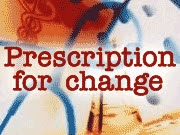 I don’t want to go on and on, in this blog, about the medical-insurance issue, but there seem to be more and more articles in the press that tell the stories of unfortunate people who get sick and can’t get treatment. These stories debunk the arguments from conservatives that, between charity care offered by hospitals and emergency-assistance programs offered by pharmaceutical companies, there aren’t that many holes in the safety net. I can only hope that America is starting to listen.
I don’t want to go on and on, in this blog, about the medical-insurance issue, but there seem to be more and more articles in the press that tell the stories of unfortunate people who get sick and can’t get treatment. These stories debunk the arguments from conservatives that, between charity care offered by hospitals and emergency-assistance programs offered by pharmaceutical companies, there aren’t that many holes in the safety net. I can only hope that America is starting to listen.Bob Herbert’s column from today’s New York Times tells of a man named Lonnie Lynam, a skilled, self-employed carpenter from Texas, who recently died of brain cancer.
Lonnie thought his headaches were migraines. They weren’t. Lacking health insurance, he avoided going to the doctor. He figured he could tough them out. (How was he going to pay for an MRI?) When his headache became so bad, one day, that he couldn’t stand up, his brother rushed him to the emergency room.
They diagnosed him, and referred him to an oncologist. There were treatments that could have helped him, but he lacked the cash. “Well, I didn’t get the treatment today,” he’d say to his mother. When she asked why not, he’d continue, “Well, I got in there and they found out I didn’t have any insurance and the woman told me I’d have to come back another time because she’d have to check with the doctor or somebody.”
 It wasn’t an outright rejection. It was couched in bureaucratic mumbo- jumbo. But, the effect was the same.
It wasn’t an outright rejection. It was couched in bureaucratic mumbo- jumbo. But, the effect was the same.Herbert concludes, “Lonnie died on March 26 at age 45. The cause of death was cancer, aided and abetted by an absurd, unnecessary and utterly unconscionable absence of health insurance.”
Herbert quotes some sobering statistics from the American Cancer Society:
“A woman without health insurance who gets a breast cancer diagnosis is at least 40 percent more likely to die,” said John Seffrin, the cancer society’s chief executive.
According to the cancer society: “Uninsured patients and those on Medicaid are much more likely than those with private health insurance to be diagnosed with cancer in its later stages, when it is more often fatal.”
The uninsured (and underinsured) are also much less likely to get the most effective treatment after the diagnosis is made.
There are 47 million Americans without health insurance and another 17 million with coverage that will not pay for the treatments necessary to fight cancer and other very serious diseases.
The bottom line, said Mr. Seffrin, is that “the number of people who are suffering needlessly from cancer because they don’t have access to quality health care is very large and increasing as I speak.”
In an earlier era, medical care was less expensive. There weren’t CT scans, MRIs, monoclonal antibody therapy, heart-bypass surgery, kidney dialysis. If you had clogged coronary arteries, diabetes or lymphoma, you would die from these things, not all that long after you were diagnosed. It didn’t much matter if you had medical insurance or if you didn’t, because there were only so many items in the doctor’s black-leather bag, and none of them were astronomically expensive.
 Nowadays, when one day in the chemo suite can cost more than several months’ salary for a laborer, lack of insurance can literally mean the difference between life and death.
Nowadays, when one day in the chemo suite can cost more than several months’ salary for a laborer, lack of insurance can literally mean the difference between life and death.The USA is the only country in the developed world that still operates in this way. Is it possible that we can be so right, and every other nation – with their universal health-care benefits – can be so wrong?